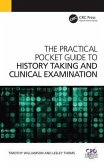A clinician's guide to maximizing patient outcomes and positive health care relationships with evidence-based communication tools Understanding Clinical Negotiation helps clinicians navigate patient desires toward mutually defined goals. Patient relations, satisfaction, and engagement are more important than ever. But today's patients, who often research their condition online or buy into direct-to-consumer pharma advertising, sometimes demand tests and treatments that are dubious or unnecessary-and expensive. This new health consumer landscape makes the ability to clinically negotiate with patients an increasingly important skill. This one-of-a-kind guide provides insights and pragmatic skills needed to strike the right balance between care and costs, while ensuring the satisfaction and safety of every patient.
Hinweis: Dieser Artikel kann nur an eine deutsche Lieferadresse ausgeliefert werden.
Hinweis: Dieser Artikel kann nur an eine deutsche Lieferadresse ausgeliefert werden.







